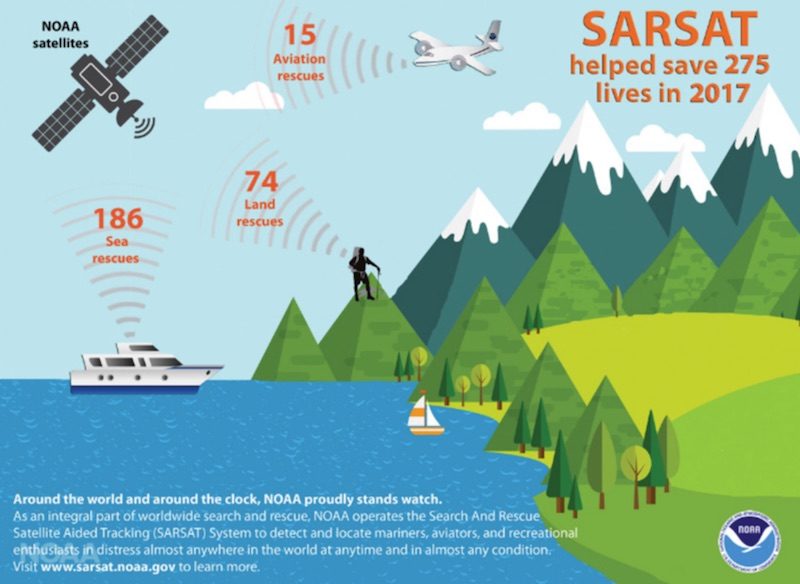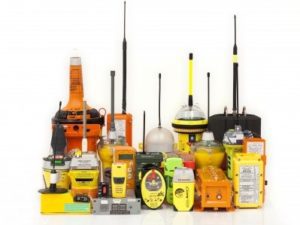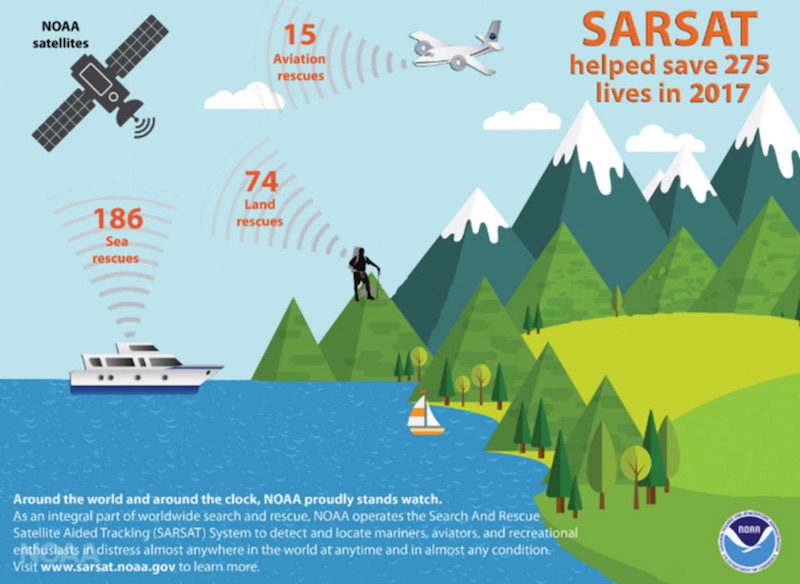
Happy 406 Day!
Each year on April 4 we celebrate 406 Day, a national campaign run by NOAA to spread awareness of the importance of emergency position indicating radio beacons, or EPIRBS, and personal locator beacons, or PLBs, in marine safety.
In 2017, a total of 275 people were rescued within the United States and its surrounding waters, thanks largely to NOAA satellites, which are part of SARSAT.
 An EPIRB works by transmitting a 406 MHz distress signal that is picked up and located by a satellite. When a NOAA satellite pinpoints the location of a distress signal, the information is relayed to the SARSAT Mission Control Center at NOAA’s Satellite Operations Facility in Suitland, Maryland. From there, the information is quickly sent to a Rescue Coordination Center, operated by either the U.S. Air Force for land rescues, or the U.S. Coast Guard for water rescues.
An EPIRB works by transmitting a 406 MHz distress signal that is picked up and located by a satellite. When a NOAA satellite pinpoints the location of a distress signal, the information is relayed to the SARSAT Mission Control Center at NOAA’s Satellite Operations Facility in Suitland, Maryland. From there, the information is quickly sent to a Rescue Coordination Center, operated by either the U.S. Air Force for land rescues, or the U.S. Coast Guard for water rescues.
To help spread the word, use #406DAY18 and help raise awareness to the need for life-saving emergency beacons.
So remember…
Beacon registration is free, easy, and is required by law! Federal law requires that all emergency position indicating radio beacons (EPIRBs), personal locator beacons (PLBs), and emergency locator transmitters (ELTs) be registered in the NOAA SARSAT Beacon Registration Database. This system is free to all owners of EPIRBs, PLBs and ELTs. When beacon user/vessel or aircraft owner information changes, it should be updated online at www.beaconregistration.noaa.gov or by contacting the NOAA SARSAT Beacon Registration Database at 1-888-212-SAVE (7283). This information is protected and only available to authorized rescue personnel if a distress activation occurs.
Beacon registration is valid for two years; owners are required to validate their beacon information every two years to ensure currency of their contact information. Up-to-date beacon owner information allows for the most efficient use of SAR resources upon beacon activation and can decrease rescue response time during distress situations.
If your EPIRB or PLB is accidentally activated, contact the U.S. Coast Guard at 1-855-406-USCG (8724) and provide them with the beacon’s ID to cancel the false alert. Search and Rescue (SAR) personnel begin responding immediately to every activation of a 406 MHz SARSAT beacon. That response will only stop if it has been proven that the activation was not a distress alert. Every false alert has the potential to put rescuers in harm’s way and waste limited Search and Rescue resources. Cancellation of false alerts helps protect SAR personnel who would be activated during an actual emergency, and ensure valuable resources are available to respond to actual distress cases.
“Registering your 406 MHz EPIRB or PLB is free, it’s easy, and this information will help confirm a distress situation exists as well as arranging for the appropriate search and rescue response,” said Chief Petty Officer Charles Froberg, command center supervisor for the Eighth Coast Guard District.

 Join The Club
Join The Club












